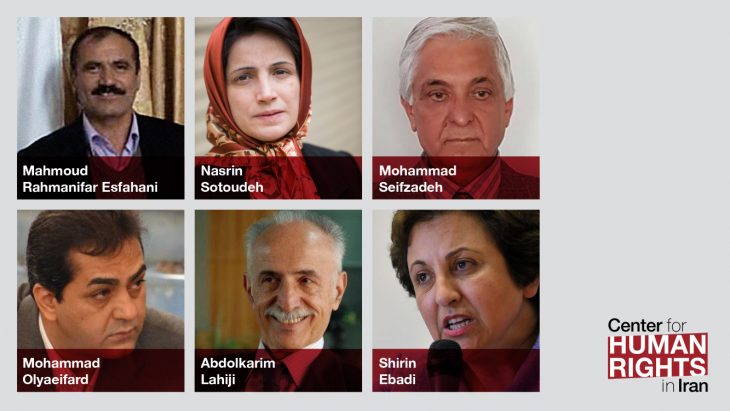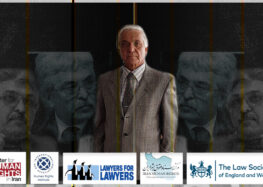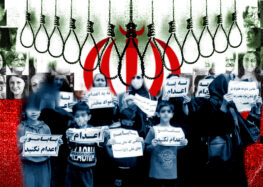Six Prominent Lawyers Call for Prosecution of Iranian Officials Who Incited Violence Against Protesters
 Nobel Peace Laureate Shirin Ebadi and five other prominent Iranian human rights lawyers have called for the prosecution of state officials who have encouraged violence against protesters in the anti-government demonstrations in Iran.
Nobel Peace Laureate Shirin Ebadi and five other prominent Iranian human rights lawyers have called for the prosecution of state officials who have encouraged violence against protesters in the anti-government demonstrations in Iran.
“We demand the immediate termination and independent prosecution of officials whose statements have had a critical impact on inciting emotions and violence during the people’s lawful and peaceful demonstrations,” said the lawyers in a joint statement sent to the Center for Human Rights in Iran (CHRI) on January 3, 2017.
The human rights defenders also called for the release of demonstrators arrested for exercising their right to peaceful assembly, which is guaranteed by Iran’s Constitution.
In addition to Ebadi, the statement was signed by Nasrin Sotoudeh, Abdolkarim Lahiji, Mohammad Seifzadeh, Mohammad Olyaeifard and Mahmoud Rahmanifar Esfahani.
“During the past few days, citizens have exercised their right to seek civil and lawful demands,” said the statement. “They have shouted slogans for an end to the financial and judicial corruption that’s gripping various institutions.”
“However, in several instances, the military and police forces have interfered with the people’s right to protest and resorted to violence, which unfortunately led to the deaths of many of our compatriots in various cities,” added the statement.
According to state-run news agencies, at least 22 people have been killed and more than a thousand arrested between December 28, 2017, when the protests began in the city of Mashhad, and January 3, 2018. Officials have avoided blaming security forces for the deaths, but anti-riot police and the semi-official Basij volunteer militia force, which operates under the Revolutionary Guards, have been instructed to quell the protests.
In interviews with CHRI, both Ebadi and Sotoudeh pointed out that Iran’s Constitution guarantees the right to peaceful protest without a permit.
“People are free to organize unarmed demonstrations and there is no need to get permission from any authority,” said Ebadi. “In recent years, we have witnessed protesters being quickly quashed in the streets while pro-government followers are brought by buses to shout slogans in favor of the Islamic Republic.”
“The regime’s agents have no right to break up lawful gatherings and beat up people,” added Ebadi, the president of the Center for the Defenders of Human Rights. “The recent demonstrations have left 23 dead and three to four thousand people have been arrested. Eyewitnesses are saying that anyone caught filming with a mobile device will be arrested. These actions are completely illegal. Even the few freedoms that are mentioned in the Constitution are not being respected.”
According to Article 27 of Iran’s Constitution, “Public gatherings and marches may be freely held, provided arms are not carried and that they are not detrimental to the fundamental principles of Islam.”
Ebadi, who was Iran’s first female judge before being forced to resign after the 1979 Islamic revolution, also called on the protesters to refrain from violence.
“The important thing in all civil actions is that people should not resort to violence,” she said. “They should not set properties on fire. Violence by the people will justify violence [by the state].”
“On the other hand, protesters should stay in the streets and should know that it is their right to do so,” she added.
Nasrin Sotoudeh, who spent three years in Evin Prison for legally defending dissidents and activists, told CHRI that the right to freedom of assembly is also recognized by the Universal Declaration of Human Rights, as well as the International Covenant on Civil and Political Rights, both of which have been ratified by Iran.
Sotoudeh added that those who revised Iran’s Constitution after the 1979 revolution fought to grant the people the right to freedom of assembly without a permit to allow dissent.
“When Article 27 was being debated, the discussion lasted many days because some delegates insisted that official permission should be required to hold rallies,” she said. “But in the end, this proposal was not accepted because the majority in the Constitutional Assembly believed that ruling governments would not issue permits to their opponents.”
Sotoudeh pointed out that some reformist politicians have also been incorrectly claiming that the protests are illegal.
“It’s not just the conservatives who are constantly claiming the protests are illegal but also some reformists as well,” she said. “That’s very unfortunate. They need to talk to a lawyer because they have no clue.”
“All branches of state, including the judiciary and the executive, have a duty to implement the Constitution and cannot deny citizens their rights,” she added.
According to Article 570 of Iran’s Islamic Penal Code, “Any official and agent associated with state agencies and institutions who unlawfully strips members of the public of their personal freedom or deprives them of their rights provided in the IRI Constitution shall be sentenced to two months to three years’ imprisonment, in addition to dismissal and prohibition of employment in state offices for one to five years.”






